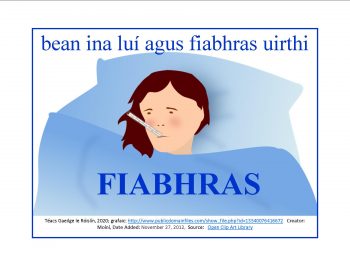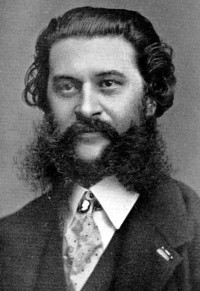Tag Archives: ort
The Irish for ‘I have a fever’ and, in passing, ‘I have the flu/hiccups/pseudopseudohypoparathyroidism’ Posted by róislín on Feb 29, 2020

(le Róislín) Given that a fever is one of the indicators of the novel coronavirus, let’s look at some vocabulary connected to fevers. The basic structure, like other illnesses or symptoms, is to say that the fever is “on you.” You may already know sentences like “Tá an fliú orm” or “Tá snag orm”, or…
Ten Ways to Say “Bravo” in Irish (using Ceol, Gairm, Beannacht, Fáinne, etc.) Posted by róislín on Feb 18, 2016
(le Róislín) Music lovers at a classical music concert will probably wait politely until the very end to call out “Bravo!” or “Brava!” during the applause. But in the realm of Irish folk music, short phrases of encouragement are often used during the song or tune, offering encouragement to the performer. They can all be…
Speaking of ‘Féasóga’ — What Color Is His ‘Féasóg’ in Irish? Posted by róislín on Jun 12, 2015
(le Róislín) Lately we’ve been talking a lot about dath gruaige in Irish, including the following: rua, fionnrua, órdhonn, donn, dubh, fionn, liath, and even, as in bréagfholt Phyllis Diller, gorm). We also practiced saying someone “has” a certain color hair in Irish. Remember, to say the person “has” that color hair, we don’t use…
If ‘brón’ can be ‘orm’ in Irish phrases like ‘TBO,’ what else can be ‘ort’? Posted by róislín on Apr 28, 2015
(le Róislín) A few posts ago, we looked at the Irish abbreviation ‘TBO‘ for “Tá brón orm” (nasc thíos). This might be a good time to look at how to say that some other emotions, feelings (like hunger or thirst), or illnesses are “on you” (ort) in Irish. How does this compare to English? In…
Lá Fhéile Pádraig! Posted by róislín on Mar 12, 2009
(le Róislín) As you might have guessed, the title phrase above means “St. Patrick’s Day,” a good time for launching this “blag nua” (new blog). Remember that in pronunciation, the “fh” of the word “Fhéile” is completely silent. For that reason, you sometimes see the phrase written as “Lá ‘Éile Pádraig,” dropping the “fh” entirely. …





